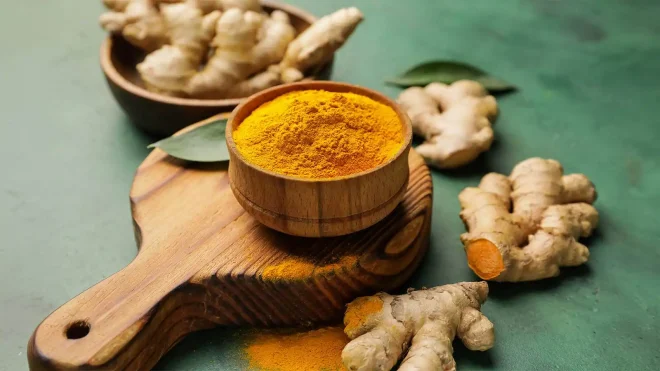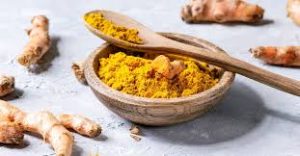
9 Good Reasons Why Turmeric Is Good for Your Health!
Turmeric is a popular Indian spice with benefits that extend beyond your plate. It can be a healthy addition to your diet. Learn about its benefits and how to use it.
Known as the “golden spice” due to its yellow color, turmeric is an important ingredient in Indian cuisine. This spice is known not only for its flavor and color, but also for its health benefits. It contains a compound called curcumin, which has antioxidant and anti-inflammatory properties. It’s commonly used in curries, soups, and even smoothies. Turmeric is thought to help boost immunity, improve digestion, and improve brain function. So next time you add some turmeric to your diet, remember that you’re not just adding flavor, you’re also giving your body the nutrients it needs! Learn all the benefits of turmeric and why you should add it to your diet.
What is turmeric?
Turmeric is a plant from India that contains a powerful compound called curcumin. The spice, derived from the ginger plant (turmeric), is native to Southeast Asia, with India being a major producer. Turmeric has a warm, slightly bitter taste and is often used to add color and flavor to curries and other dishes. Thanks to curcumin and other active ingredients, turmeric may help reduce inflammation and is often used to manage pain and inflammation. It is also an important part of many Indian medical systems.

What are the benefits of turmeric?
Here are 9 benefits of turmeric that may encourage you to include it in your diet:
1. Has anti-inflammatory properties
If your muscles are sore and your joints are constantly aching, you should try adding turmeric to your diet. It contains a bioactive compound called curcumin, which acts as a painkiller, helps reduce inflammation and relieve pain. A study published in the Journal of Oxidative Medicine and Cellular Longevity shows that due to these properties, it can play an important role in reducing the risk of many diseases such as heart disease and joint problems such as arthritis.
2. Rich in antioxidants
Turmeric is rich in antioxidants that kill free radicals in the body. Free radicals are harmful molecules that cause oxidative stress and brain damage. A study published in the Journal of Antioxidants found that curcumin helps neutralize free radicals, reduce oxidative damage, and improve overall health. This antioxidant effect slows down aging and reduces the risk of many diseases.
3. Reduce pain
If you have persistent pain, turmeric is a game changer for you. Turmeric has anti-inflammatory properties and curcumin can help reduce pain, especially joint and muscle pain. By reducing inflammation in the body, turmeric helps reduce discomfort associated with arthritis and osteoarthritis. So add this natural pain reliever to help control discomfort.
4. Improve liver function
Another benefit of turmeric is its beneficial effects on liver function. The liver is an important part of the body that works hard to filter toxins. Curcumin has been shown to improve liver function by producing bile, helping to digest fats and eliminate toxins. Research published in the BMC Complementary and Alternative Medicine journal also suggests that turmeric’s antioxidant effects may protect your loved one from toxins.
5. Reduce your risk of cancer
Yes, turmeric can reduce your risk of cancer and improve your overall health. According to a study published in the Journal of Nutrition, curcumin has been shown to be an effective herb in treating cancer. It can help inhibit the growth and development of cancer cells and prevent them from spreading. Although more research is needed, adding turmeric to your diet may be one way to reduce your risk of cancer.
6. Aid digestion
Do you often have digestive issues? Include turmeric in your routine if possible. Turmeric is known to produce bile, which can help digest fats faster and reduce intestinal inflammation. Additionally, according to research published in the journal Metabolic Brain Diseases, turmeric’s antioxidant and anti-inflammatory properties may help improve digestion and reduce symptoms of gastrointestinal disorders like irritable bowel syndrome (IBS).
7. Improve memory
Curcumin not only supports your physical health, it also improves your cognitive ability. A study published in Neuroregeneration Research shows that turmeric can improve memory and cognitive function. It helps reduce the risk of inflammation and oxidative damage that can lead to Alzheimer’s disease. Turmeric is also beneficial because it is thought to increase levels of brain-derived neurotrophic factor (BDNF), a protein associated with brain development and mood.
8. Fights free radicals
As mentioned earlier, turmeric is rich in antioxidants that help fight free radicals. Free radicals are reactive molecules that can damage cells and cause many health problems. According to Antioxidant Journal, turmeric helps protect your brain from oxidative damage and improves overall health by neutralizing free radicals. This antioxidant effect is especially important for cell health and preventing premature aging.
9. Helps manage depression
Turmeric has been shown to help improve mental health by reducing the risk of anxiety and depression. The curcumin in turmeric may have a mood-enhancing effect and may help reduce symptoms of depression. But remember, this is not a replacement for traditional treatments for mental health issues. It’s just one way to provide additional mental support.

Turmeric Side Effects
Turmeric is widely used for its health benefits and color, but the curcumin it contains can cause some side effects, especially when consumed in excess. Here they are:
1. Stomach upset
A side effect of the warning is abdominal pain due to the presence of intestinal inflammation. This usually only occurs when high doses of turmeric or supplements are taken. Turmeric stimulates the production of acid in your stomach, which can negatively affect your digestive system. A study published in the Journal of Clinical and Experimental Pharmacology and Physiology showed that some participants who used turmeric in cancer treatment developed digestive problems, causing them to discontinue the spice in their daily lives.
2. Blood thinning
Turmeric has cleansing properties that can thin the blood and increase the risk of bleeding, especially during surgery and when taking other types of anti-inflammatory drugs (blood thinners). According to a study published in the American Journal of Health – System Pharmacy, people taking blood-thinning medications such as warfarin (Coumadin) should avoid taking large amounts of turmeric because it can cause them to bleed more. Blood thinners are used to prevent blood clots from forming and to reduce the risk of medical problems caused by blood clots, including heart disease, stroke, and more.
3. Contractions
Turmeric can also cause uterine contractions and can cause problems in pregnant women or people with some reproductive problems, so do not forget to drink turmeric after consulting your doctor.
4. Iron absorption
Consuming high amounts of turmeric can prevent iron absorption. According to research published in the journal Cureus, it is one of the spices known to inhibit iron absorption in the body by 20 to 90 percent, thus reducing iron in the body. Therefore, you should be careful when taking turmeric.
Who should not use turmeric?
Although turmeric is generally safe and has health benefits, some people should avoid or limit its use. These include:
- Pregnant or breastfeeding women
- Patients with kidney or gallbladder disease
- A person receiving medical treatment
- A person with liver or bile problems
- A person with anemia, diabetes, or iron deficiency
- A person taking anticoagulants or antidiabetic medications
- A person who has had surgery in the last two weeks
If you have any of these conditions or are taking medications, talk to your doctor before adding turmeric to your diet to make sure it is safe for you.
What medications should you not take turmeric with?
Turmeric can interact with many medications, so be careful when taking it. Avoid or talk to your doctor if you are taking the following medications:
- Blood pressure lowering medications such as warfarin and clopidogrel.
- Blood thinning supplements sucg as cloves, ginger, garlic, sage, angelica, ginkgo, willow leaves, and other blood-activating tonics.
- Antidiabetic medications such as glyburide.
- Chemotherapy drugs, such as doxorubicin, cyclophosphamide, paclitaxel, and docetaxel.
- Hormone replacement therapy.
- Antibiotics, such as norfloxacin.
- Cholesterol-lowering drugs, such as statins.
- Anti-inflammatory medication: sulfasalazine.
- Gout medications such as colchicine.
- Menopause medication, fezolinetant.
Be sure to consult your doctor before adding turmeric to your treatment regimen, especially if you are taking these medications.

How to consume turmeric?
You can add this spice to your daily cooking to add color and flavor to a variety of foods and drinks. It is often used in Indian cuisine, especially in curries and sabzis, due to its bright yellow color. Here are some ways you can include turmeric in your daily diet:
- Turmeric Tea
- Golden milk
- Soups and broths
- Roasted vegetables
- Rice dishes
- Lentils or bean stew
Make sure to include turmeric in your daily diet to enjoy these health benefits!
